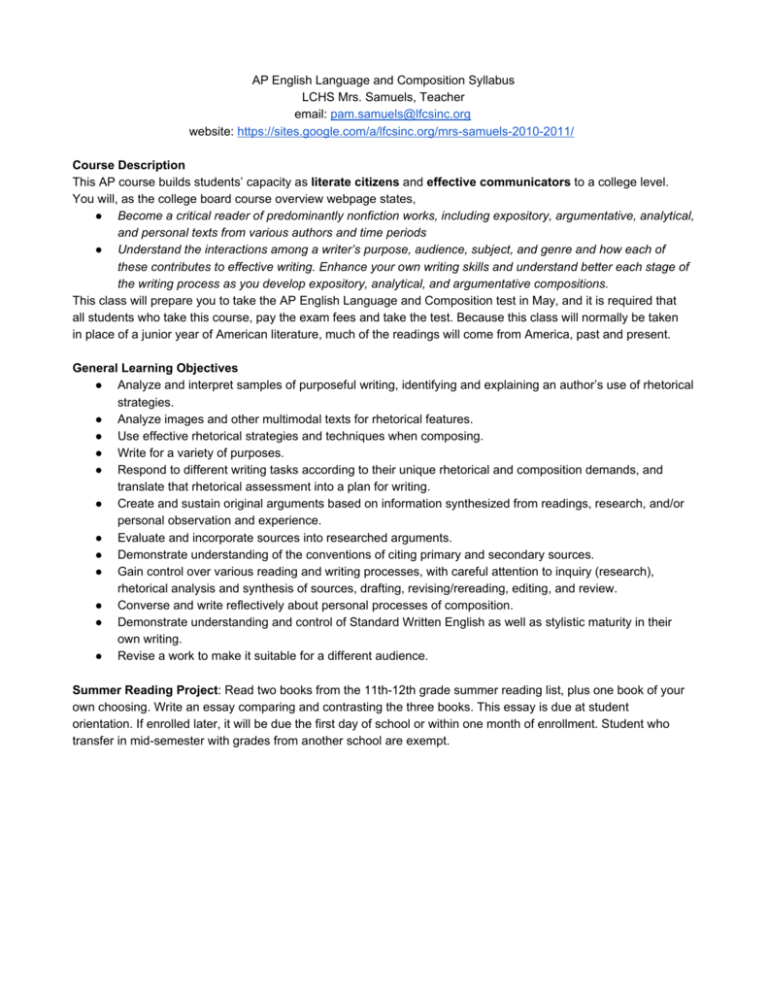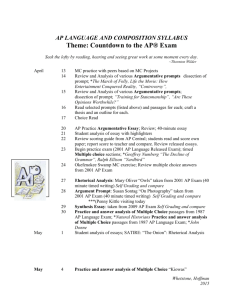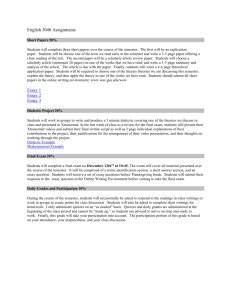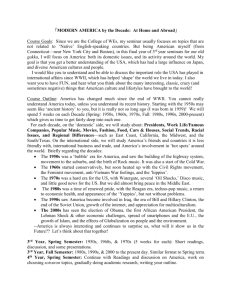English Language and Composition AP Syllabus
advertisement

AP English Language and Composition Syllabus LCHS Mrs. Samuels, Teacher email: pam.samuels@lfcsinc.org website: https://sites.google.com/a/lfcsinc.org/mrs­samuels­2010­2011/ Course Description This AP course builds students’ capacity as literate citizens and effective communicators to a college level. You will, as the college board course overview webpage states, ● Become a critical reader of predominantly nonfiction works, including expository, argumentative, analytical, and personal texts from various authors and time periods ● Understand the interactions among a writer’s purpose, audience, subject, and genre and how each of these contributes to effective writing. Enhance your own writing skills and understand better each stage of the writing process as you develop expository, analytical, and argumentative compositions. This class will prepare you to take the AP English Language and Composition test in May, and it is required that all students who take this course, pay the exam fees and take the test. Because this class will normally be taken in place of a junior year of American literature, much of the readings will come from America, past and present. General Learning Objectives ● Analyze and interpret samples of purposeful writing, identifying and explaining an author’s use of rhetorical strategies. ● Analyze images and other multimodal texts for rhetorical features. ● Use effective rhetorical strategies and techniques when composing. ● Write for a variety of purposes. ● Respond to different writing tasks according to their unique rhetorical and composition demands, and translate that rhetorical assessment into a plan for writing. ● Create and sustain original arguments based on information synthesized from readings, research, and/or personal observation and experience. ● Evaluate and incorporate sources into researched arguments. ● Demonstrate understanding of the conventions of citing primary and secondary sources. ● Gain control over various reading and writing processes, with careful attention to inquiry (research), rhetorical analysis and synthesis of sources, drafting, revising/rereading, editing, and review. ● Converse and write reflectively about personal processes of composition. ● Demonstrate understanding and control of Standard Written English as well as stylistic maturity in their own writing. ● Revise a work to make it suitable for a different audience. Summer Reading Project: Read two books from the 11th­12th grade summer reading list, plus one book of your own choosing. Write an essay comparing and contrasting the three books. This essay is due at student orientation. If enrolled later, it will be due the first day of school or within one month of enrollment. Student who transfer in mid­semester with grades from another school are exempt. SEMESTER 1 1st QUARTER: Intro to rhetoric and rhetorical analysis Progress report #1 ● Readings: pieces by Plato, Banneker, Sontag, Gehrig, Einstein, Bush ● Concepts: Intro to AP lang, plagiarism, the rubric, Aristotle’s 5 canons, Hayakawa’s Ladder of Abstractions, types of evidence, rhetorical triangle, SOAPS ● Writings: all school timed essay, two AP timed writings, Abstraction processed piece. ● Read from ERA 1 ● Tests: Plagiarism certificate Progress report #2 ● Readings: pieces by King George, Cofer, Lord Chesterfield, Nixon, Eisenhower, Morrison, Didion, Barry ● Concepts: appeals, visual texts, annotating, toulmin model, brainstorming, arch method, précis ● Writings: all school timed essay, final draft of abstraction processed piece, 3 AP timed writings ● ERA 1 independent reading book completed along with google doc and reading conference by 10/3. Start reading from ERA 2 ● Tests: rhetoric terms test 1 9/26, rhetoric terms test 2 2nd QUARTER: More rhetorical analysis and modes of development Progress report #3 ● Readings: pieces by Heyman, Royte, Orwell, Shelley, and assorted readings in different modes ● Concepts: Modes of Development: narration, process analysis, comparison and contrast, definition, cause and effect ● Writings: all school timed essay, 5 précis, 1 AP timed writing, work on 5 mode essays ● ERA 2 independent reading book completed along with google doc and reading conference. Start reading from ERA 3.. ● Tests: rhetoric terms test 3 Semester 1 ● Concepts: continuation of modes project, multiple choice boot camp, final review ● Writings: 5 essays on one topic in different modes, all school timed essay, AP final essay ● ERA 3 independent reading book completed along with google doc and reading conference. Start ERA 4 book. ● Final ESLR evaluation for all school projects ● Tests: rhet terms test 4, multiple choice final SEMESTER 2 3rd QUARTER: Argument and synthesis Progress report #4 ● Readings: pieces by Domini, Ebert, Quindlen, Oladipo, Santiago, Walker, Orenstein Works from Revolutionary Era Reading List, O’Connor and romer, Gladwell, Jefferson, Stanton ● Concepts: Focus on the argument free­response question, kinds of arguments, classical, Rogerian and Toulmin arguments, appeals, structural choices such as inductive vs. deductive reasoning, author’s purpose, argumentative moves such as concession and rebuttal, kinds of evidence, role of audience, analyzing visual texts as argument ● Writings: 3 AP argument timed writings, persuasive speech (processed and possible portfolio choice) ● ERA 4 independent reading book progress check ● Tests: rhet terms test 5, fallacies test Progress report #5 ● Readings: pieces by Hillenbrand, Early, Pinker, and assorted readings about community service and about the dumbest generation. ● Concepts: Focus on the synthesis free­response question, source­based synthesis, conceptual synthesis, synthesis of voice, the synthesis process of authentic inquiry, linking sources, source­informed argument with sophistication of thought, development of argument, unity/coherence, ● Writings: all school timed essay, 2 AP synthesis timed writings, Synthesis Project ● ERA 4 independent reading book completed along with google doc and reading conference. Start ERA 5 book. ● Tests: rhet terms revisited 4th QUARTER: Preparation for the exam Progress report #6 includes all work from the beginning of the year and turned in by Friday 5/8 ● Readings: from Zinser, Truss and more ● Concepts: syntax, grammar, bracketing, immature vs. sophisticated writing ● Writings: 1 analysis prompts, 1 synthesis prompt, portfolio rewrites, processed piece: a 7 paragraph essay which describes 5 examples of students’ own missteps in writing or immature prose style that they discovered as they reviewed their portfolio ● ERA 5 independent reading book completed along with google doc and reading conference. Start ERA 6 book. ● Tests: multiple choice, rhet terms revisited Semester 2 high school transcript grade includes all work completed for the semester and turned in by 6/6, plus additional final exams the following week. ● Readings: Visual texts. Didion, Dillard ● Concepts: style, multiple choice training, reverse outlining, review of all concepts, specifics about the AP exam ● Writings: all school timed essay, 1 analysis prompt, final prompts: argument and synthesis, abbreviated biography and 15 minutes of fame speech ● ERA 6 independent reading book completed along with google doc and reading conference ● Final ESLR evaluation for all school projects ● Tests: AP exam, multiple choice final Attendance in all classes for which a student is registered is an essential part of meeting the requirements to pass each course. Students will not receive credit for a registered course if they have more than 7 excused or unexcused absences within any one semester. Course absences can be made up by completing the missed course work through an independent contract provided the missed course work is completed within 2 weeks of the due date or by completing the missed course work during Saturday school. AP Exam: All students enrolled in an AP class are committed to pay the fee for the exam and take the exam in May. Textbook: The Language of Composition, 2nd Edition Each student will receive a textbook to keep at home. It must be returned in the same condition that it was received before final grades will be entered on the student’s transcript. If a textbook is returned to the classroom, make sure and get a signed receipt for the textbook. If a classroom library book is borrowed. Please take care of it and return as soon as possible. $5 fee if the book is lost. Feel free to donate to our classroom any books not being used any more. Grading Formative: 15% Daily assignments 15% Independent reading Summative: 50% Writings, Tests, and Projects 20% Final Unweighted / Weighted Weighted Grade Percent College Prep G.P.A Honors G.P.A. AP G.P.A. A 100% ­ 94% 4 4.5 5 A­ 93%­90% 3.75 4.25 4.75 B+ 89%­87% 3.5 4 4.5 B 86%­84% 3.25 3.75 4.25 B­ 83%­80% 3 3.5 4 C+ 79%­77% 2.8 3.3 3.8 C 76%­74% 2.4 2.9 3.4 C­ 73%­70% 2 2.5 3 D+ 69%­67% 1.8 2.3 2.8 D 66%­65% 1.4 1.9 2.4 F 64%­0% 0 0 0 Classroom Grading Features Students who earn a percent less than fifty on an assignment will receive 50% . Students who do not turn in an assignment that can be made up will receive 40%. Therefore, if you see a 40% grade on any assignment, make it up immediately. Save returned assignments in case there is a question on the grade later on. Make up work immediately. If you have a question regarding a grade, talk with the teacher outside of class­­ before or after school, during break or lunch, or by email anytime. Extra Credit No assignments will be given as extra credit to help make up work that was not done or improperly done. Many assignments can be re­done. If a student “knocks my socks off” on an assignment, I may give more than 100% as a grade. A very few assignments will be optional­­a way to earn credit if the student chooses, or not. In this class the words “Extra Credit” generally mean extra privileges. Classroom Guidelines: 1. Come every day ­on time (in seat at the start of class) ­dressed for success (prescribed dress for the day) ­supplies in hand ­homework out and ready to turn in ­with a ready­to­learn attitude. 2. Treat everyone and everything with respect and kindness. 3. Follow all school rules, classroom procedures, and directions. 4. Risk! Go for it and give every task your very best. Basic Guidelines: 1. No hoods or hats. 2. Water bottles are encouraged to hydrate the brain, but no other food or drinks. 3. No technology use without direct permission every time. 4. Any electronics used without permission must be given to the teacher when asked. They will then be given to the principal. 5. Passes are not a right and are given at the discretion of the teacher. ­if you want a pass to leave class expect the answer to be no. ­if it is an emergency, inform the teacher politely and take a seat. ­Your task is to remain in class the whole period. 6. Please sit in assigned seats for attendance purposes. There will be many opportunities to move. Supplies: several pens (dark ink) and pencils (with erasers) planner and pass sticker lined paper with no ragged edges (4 clean sheets per day) Rewards and consequences: Rewards for positive behavior means more privileges for individuals and for the class as as whole­­and more learning! Consequences include warning, time­out, student­teacher conference, parent contact, administration contact. Pass Policy: Students are expected to be in class everyday and stay in class the whole period. The default response to any request for a pass is no. Students should take care of restroom needs between classes and office needs during breaks and before/after school. What most students believe to be emergencies are not. That being said, genuine emergencies and extenuating circumstances arise. Rewards in the classroom will often come in the form of a free “yes” pass which should be saved for emergency situations. Major projects turned in on the due date qualify for one of these pass rewards (including summer project turned at student orientation). Also, lit terms tests that score 100%. Communication makes all the difference. Email works great for me (Mrs. Samuels, the teacher). If I don’t answer right away, please don’t assume I am ignoring you! Sometimes a flood of emails comes through or one seems to get lost in cyberspace! Email again to check. Your thoughts are important to me and I don’t want to miss them. Parents and Students are responsible to know this information and follow accordingly. Your signatures on the response form indicates that you have read, understand, and are agreeable with the above terms of the course. If you have any questions, please contact me. Attitude is everything. Your readiness to learn, to participate, to take risks, to delight in the incredible world of the English language will take us to incredible places!during breaks and before/after school.






